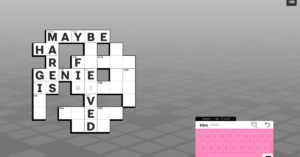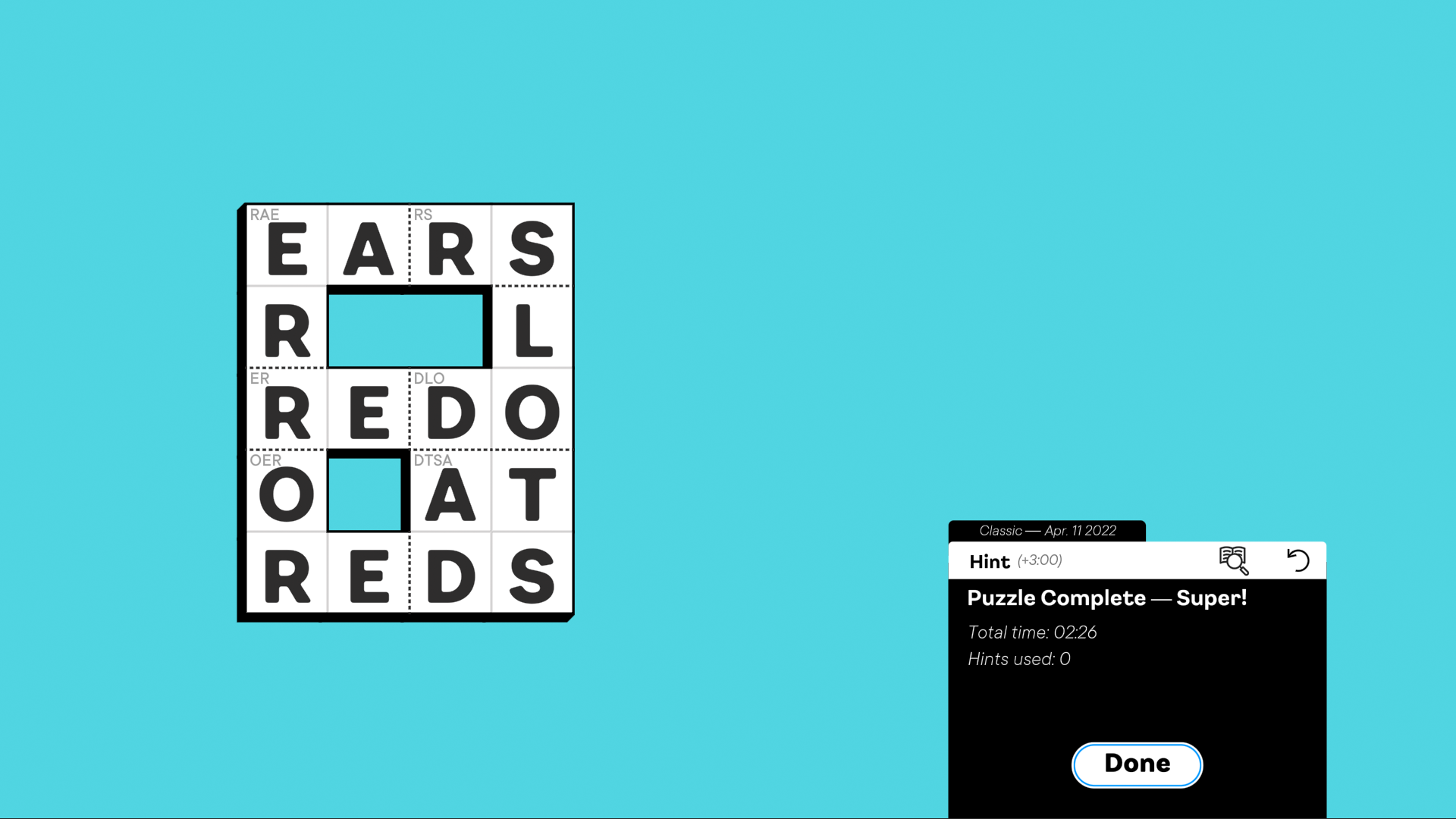For years, designer Zach Gage has been in love with the works of the famous Japanese game publisher Nikoli. The company is best known for popularizing sudoku and is known for its minimalist approaches as nonograms (which Nintendo fans might recognize as Picross). For Gage, it was a long-sought goal to create that kind of clean, straightforward and accessible puzzle. He describes it as a “kind of obsession”, one that “feels like a really big design challenge because it’s so hard to do.” He tried lots of ideas, but eventually he landed on a solution: the humble crossword puzzle.
This week, Gage and partner Jack Schlesinger release Knowwords on iOS, Android, Mac and PC. It’s a game built on the premise that the most interesting part of a crossword puzzle is actually not all the clever clues, but the lettering itself. “There’s the kind of weird thing about crossword puzzles, which is that if you talk to crossword puzzlers about crossword puzzles, it’s about the clues and the structure of the clue,” Gage says. “But the thing is, the actual grid of letters is incredibly complicated … but as a player, it’s like this little side effect that you do not even focus on.”
Knowwords uses the grid as the basis of a word-focused puzzle. Every Knowwords Puzzle looks like a crossword puzzle, but instead of using cryptic clues to solve what are basically trivia issues, you solve the puzzle by creating valid words from predetermined groups of letters. Each puzzle is divided into zones, and in each zone you can use only certain letters. The challenge comes from figuring out ways to use the specific arrangements of letters to create the correct words that fill the grid like in a crossword puzzle. For those who can not visualize it, check out the GIF below or the trailer above:
If Gage’s name sounds familiar, it’s probably because he’s released a number of apps over the last few years aimed at reinventing or reinventing classic games. This includes e.g. Really bad chess, Flipflop Solitaireand Pocket-Run Pool. He even designed a new version of Snake for the just-released handheld Playdate, and in 2020 he teamed up with Schlesinger in an effort to create a better digital version of sudoku. The concept of Knowwords actually precedes God Sudoku: The couple originally put the project on hold to work on the sudoku game. As part of that experience, they found new inspiration from KenKen, a sudoku derivative that divides the puzzle grid into zones, each of which has a mathematical equation attached, so you not only have to solve the traditional sudoku puzzle, but also get the math correct. Schlesinger came up with the idea of applying it to their pun game prototype.
“It really struck a chord when I was working on it God Sudoku, my mom really tried to get me to make a KenKen game instead, ”says Gage. “She said ‘sudoku is really boring. KenKen is really interesting because in sudoku you just use patterns. But in KenKen every situation is unique and you have to think through the possibilities of space in a way.'” Gage says that when he used the zone idea to Knowwords “it worked right away.” The pair then split; Gage began hand-making puzzles while Schlesinger developed a jigsaw puzzle generator. They would then compare notes to figure out how to generate ideal puzzles for the final game.
Of course, you can not talk about a pun in 2022 without mentioning the six-letter elephant in space: Wordle. To call Josh Wardle’s daily guessing game a sensation would be to say it lightly. Gage says that seeing Wordle’s breakout success – which among many other things includes being acquired by New York Times – “has been inspiring,” and influenced a number of aspects of Knowwords. Perhaps most notable is the structure; one of Wordles defining feature is that there is only a single puzzle each day, creating a kind of ritual for players. The free version of Knowwords will also offer a new puzzle every day along with 10 additional puzzles every month. (The game will be free to download, but a one-time in-app purchase of $ 11.99 or an annual subscription of $ 4.99 will give players access to the full experience, including an archive of past puzzles.)
The idea was to stay away from the retention-driven nature that is so common in games – things like the daily quests that dominate most live service experiences – and instead find a structure that encourages players to fit Knowwords into their lives in a more natural way. “I’m interested in making games that are designed to be played a certain way and celebrating people who like to play games that way,” Gage explains. “It’s fun to have something in your life that looks like a ritual where you play one of these every day or you wake up and do this thing before breakfast or you wake up and solve your crossword puzzle with breakfast. “
The other big thing Wordle did was to find an ingenious way for players to share the experience; we have all seen our social feeds flooded with squares representing that day’s puzzle. It is a clear picture that is exciting for those who do not play, but which also has extra significance for those who have made Wordle part of their routine. Knowwords goes in a slightly different direction. Because the game also works like a pen-and-paper game, when you solve a puzzle you really love, you can share a blank, printable version of the puzzle that people on your feed can take and solve, even if they do not have it is installed. “Why not share the puzzle on the internet and in a way say, ‘I really love this puzzle today. This was a really good one. Check it out.”
That pen-and-paper character could also point to the future of the game. Just as crossword puzzles and sudoku have become prevalent in part due to newspaper syndication, Gage believes Knowwords could follow a similar pattern. This in turn creates the potential for localized versions of the game; while currently only available in English, Gage envisions a future in which puzzle makers design their own puzzles for local markets. “If it’s something that succeeds,” he says of Knowwords“going after a syndication market is something we’re really interested in because I think it works really well as a pen and paper game.”
So far, however, the focus is on the digital version of the game, which launches on April 28.


